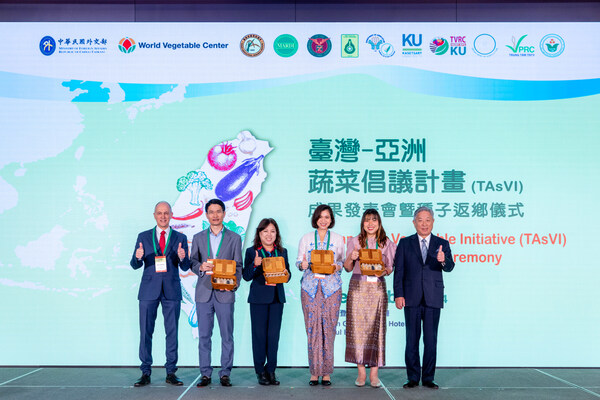Assessing trends, current status, and building an inclusive roadmap for future conservation and use
3-4 December 2024
World Vegetable Center headquarters, Shanhua, Taiwan
TAIPEI, Dec. 3, 2024 /PRNewswire/ -- Vegetables are hugely important for human nutrition, and for diverse and resilient farming systems that generate income for smallholder producers, processors and traders. But, due to changes in the climate, diets and land use, we see a loss in crop diversity, wild species and varieties that could hold valuable genetic material for breeding more tolerant and productive crops in the future. So, we urgently need to conserve and use more vegetable biodiversity, and this symposium is major step in that direction. The event will be attended by 35 professionals from 11 countries across Southeast Asia.

Seed Handing Over Ceremony (from left to right) Dr. Marco Wopereis, World Vegetable Center. Mr. Minh Tien Pham, Vietnam Economic and Cultural Office in Taipei. Ms. Irene Tan, Manila Economic and Cultural Office. Ms. Aznifah Ghani, Malaysian Friendship and Trade Centre, Taipei. Dr. CHUTCHAMAS KANCHANA-UD, Tropical Vegetable Research Center(TVRC). Mr. Chung-Kwang Tien, Deputy Minister of Foreign Affairs.
This important international symposium comes at the end of the first phase of the Taiwan Asia Vegetable Initiative – 'the TAsVI project' – that is strengthening international collaboration for conserving more vegetable biodiversity in Asia, and promoting the use of vegetable germplasm in research, breeding and farming for improved health, nutrition and climate resilience. The World Vegetable Center leads implementation, with partners in Malaysia, the Philippines, Taiwan, Thailand and Vietnam.
It begins on Tuesday 3 December with introductions, including The WorldVeg Director General and representations from the Taiwan Ministry of Foreign Affairs, and other organizations. This will be followed by keynote presentations by leading WorldVeg scientists, and regional perspectives from many ASEAN countries. The second day will focus on building regional consensus on the development of the Southeast Asian Vegetable Biodiversity Rescue Plan, to benefit all countries.
A key component of the Taiwan Asia Vegetable Initiative has been the repatriation back to their respective home countries of more than 3,000 vegetable seed accessions stored at the WorldVeg genebank in Taiwan, that were collected across these countries 20-30 years ago. 'Seed homecoming ceremonies', celebrating the return of these seeds to respective national authorities, have been held in Thailand, the Philippines and Vietnam in late 2024, alongside national workshops to promote the use of the accessions being sent 'back home', by connecting national genebanks with universities, government organizations, seed companies and farmer organizations. This aim is to expand such activities across the wider Southeast Asia region.
For media, contact - sara.chen@worldveg.org and angel.jeng@worldveg.org
For technical information, contact - maarten.vanzonneveld@worldveg.org
Acknowledgements
This symposium is part of the Taiwan Asia Vegetable Initiative (TAsVI), funded by the Taiwan Ministry of Foreign Affairs (2022-2024). It is implemented by the World Vegetable Center, in partnership with the Taiwan Agricultural Research Institute (TARI) National Plant Genetic Resources Center; Malaysia Agriculture Research and Development Institute (MARDI) Horticulture Research Centre; University of the Philippines Los Baños (UPLB) Institute of Plant Breeding, and Bureau of Plant Industries (BPI), the Philippines; Kasetsart University Tropical Vegetable Research Center (TVRC), and Department of Agriculture Horticulture Research Institute national genebank, Thailand; and Fruit and Vegetable Research Institute (FAVRI), and Vietnam Academy of Agricultural Sciences (VAAS) Plant Resource Center (PRC), Vietnam.










